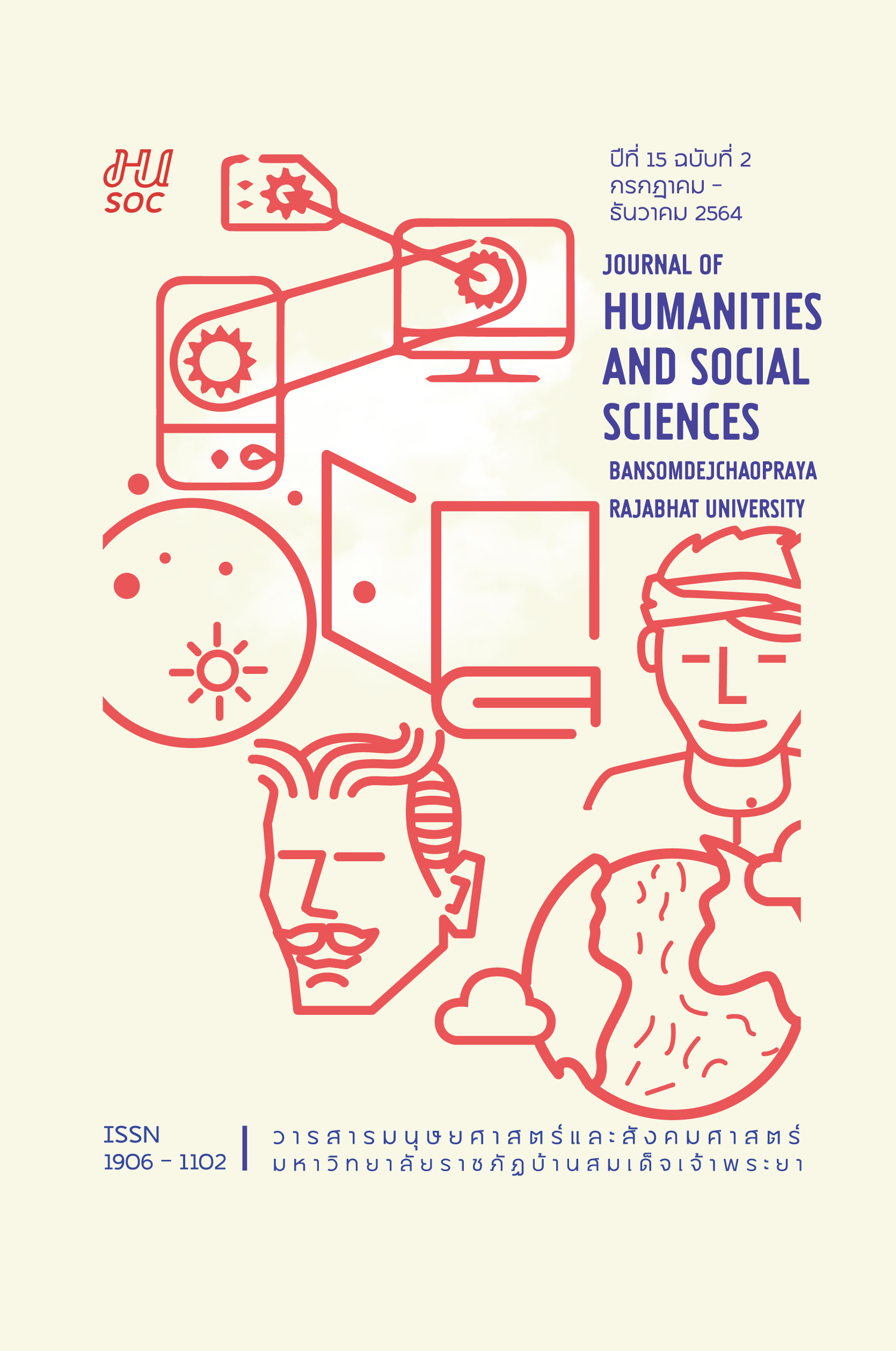Participation of OTOP Tourism Community at Ban Ton Pho, Pathumthani Province for Sustainable Tourism
Keywords:
OTOP Tourism Community, Participation, Tourist AttractionAbstract
The purposes of this study were: 1) to study the process of participation of the Ban Ton Pho community as an OTOP community; 2) to study the opinions of tourists towards community participation in order to create guidelines for the participation of the OTOP Tourism Community in Ban Ton Pho, Pathumthani Province for Sustainable Tourism. Research methodologies were mixed between quantitative and qualitative research. For qualitative research, an in-depth interview form was used as a data collectiontool to ask stakeholders in the community, such as the government sector, entrepreneurs, and local people. However, the quantitative data were collected from Thai tourists by using questionnaires as a research instrument. The results of the study in-depth interview were as follows: 1) Decision making: Local people were involved in the decision to participate in the project, including the selection of attractions within the village and activities in the learning center. 2) Operational aspect of participating in the project: Not all the local people were involved in this aspect, but there were representatives from the villages and the village headman was a follower of the project's operations with the government sector. 3) Benefit: Local people participated in receiving benefits from the project. Revenue generation creates a career for the people in the area and promotes the village products. 4) Evaluation: Not all local people were involved in this area and were assessed by the village headman, community committees, and the government. The village headman will be the representative and coordinate with the people in the area to get the information. The results of the Thai tourists participation in Thai tourism revealed that most of the tourists who answered the questionnaire were female, aged between 20 and 30 years old, with a bachelor's degree. Their average monthly income is between 10,001 baht and 20,000 baht. Most of them received information about the community's tourism through friends,relatives, or acquaintances, and it was their first time traveling.The purpose of traveling was for leisure or sightseeing.Most of them traveled during the weekend and spend less than 1,000 baht per trip. Opinions of tourists towards activities within the OTOP Tourism Community of Ban Ton Pho are as follows: tourism resources and access to the tourism community's level are very good. In terms of facilities within the tourism community, there was a good opinion on the components of services within the tourism community. The comment level is very good.
References
กรมพัฒนาชุมชน. (2561). คู่มือบริหารโครงการชุมชนท่องเที่ยว OTOP นวัตวิถี. สืบค้น 25 กันยายน 2563, จาก http://www.oic.go.th/FILEWEB/CABINFOCENTER3/DRAWER051/GENERAL/DATA0000/00000042.PDF
การท่องเที่ยวแห่งประเทศไทย. (2544). แผนปฏิบัติการการท่องเที่ยวเชิงนิเวศแห่งชาติ/กองอนุรักษ์การท่องเที่ยวแห่งประเทศไทย. กรุงเทพฯ: การท่องเที่ยวแห่งประเทศไทย.
กุลจิรา เสาวลักษณ์จินดา. (2555). การมีส่วนร่วมของชุมชนต่อการจัดการ แหล่งท่องเที่ยว: กรณีศึกษาอำเภออินทร์บุรี จังหวัดสิงห์บุรี. [ปริญญาบริหารธุรกิจมหาบัณฑิต. มหาวิทยาลัยเทคโนโลยีราชมงคลธัญญบุรี].
ณิชาภัทร สุรวัฒนานนท์. (2562). การท่องเที่ยวกับบทบาทขับเคลื่อนเศรษฐกิจไทย ฮีโร่จำเป็นหรือ ฮีโร่ตัวจริง?. สืบค้น 12 กันยายน 2563, จาก https://www.bot.or.th/Thai/ResearchAndPublications/articles/Pages/Article_29Oct2019.aspx/
เทิดชาย ช่วยบำรุง. (2552). บทบาทขององค์กรปกครองส่วนท้องถิ่นกับการพัฒนาการท่องเที่ยวอย่างยั่งยืนบนฐานแนวคิดเศรษฐกิจพอเพียง. นนทบุรี: สถาบันพระปกเกล้า.
ธนบูรณ์ ตรีวารี. (2561). การจัดการการท่องเที่ยวเชิงวัฒนธรรมประเพณีแบบมีส่วนร่วมของชุมชน ในพื้นที่อำเภอพระประแดง จังหวัดสมุทรปราการ. กรุงเทพฯ: มหาวิทยาลัยศรีนครินทรวิโรฒ.
นาฏสุดา เชมนะสิริ. (2555). การพัฒนาแหล่งท่องเที่ยวเชิงเกษตร. กรุงเทพฯ: โรงพิมพ์ฟิสิกส์เซ็นเตอร์.
บุญเลิศ จิตตั้งวัฒนา. (2548). อุตสาหกรรมการท่องเที่ยว = Tourism Industry. กรุงเทพฯ: ศูนย์หนังสือมหาวิทยาลัยธรรมศาสตร์.
เมตต์ เมตต์การุณ์จิต. (2553). การบริหารจัดการศึกษาแบบมีส่วนร่วม: ประชาชนองค์กรปกครองส่วนท้องถิ่นและราชการ. กรุงเทพฯ: บุ๊ค พอยท์.
วิชชญะ น้ำใจดี. (2561). การมีส่วนร่วมของชุมชนในนโยบายการจัดการแหล่งท่องเที่ยวเชิงวัฒนธรรม: กรณีศึกษา บ้านเชียง จังหวัดอุดรธานี. กรุงเทพฯ: มหาวิทยาลัยศรีนครินทรวิโรฒ.
อัจฉรียา ศักดิ์นรงค์. (2549). การมีส่วนร่วมของชุมชนและแนวทางในการจัดการการท่องเที่ยวเชิงเกษตรกรรม: กรณีศึกษาตำบลหนองตะพาน อำเภอบ้านค่าย จังหวัดระยอง. กรุงเทพฯ: มหาวิทยาลัยศรีนครินทรวิโรฒ.
Cochran, W. G. (1977). Sampling Techniques. New York: John Wiley and Sons.
Cohen, J. M. & Uphoff, N. T. (1980). Participations Place in Rural Development: Seeking Clarity Through Specificity. New York: World Developments.
Cooper, C. & Boniface, B. G. (1998). Geography of Travel and Tourism. UK: Butterworth Hheinemann.
Downloads
Published
How to Cite
Issue
Section
License

This work is licensed under a Creative Commons Attribution-NonCommercial-NoDerivatives 4.0 International License.




